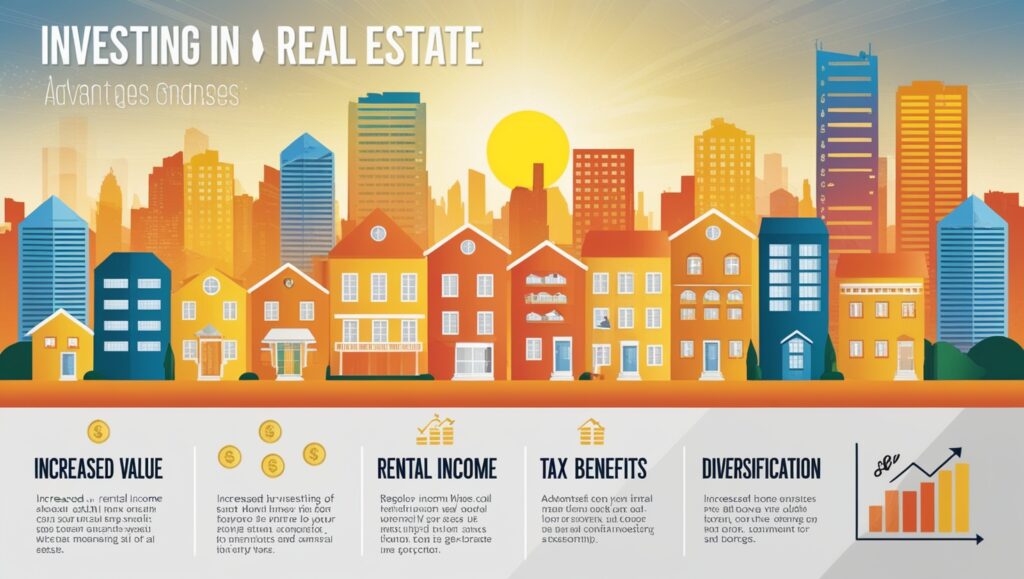Property ownership status has long been associated with wealth and trustworthiness. Just like investing in gold, investing in an asset will be your safest bet, but now, as we step into this new era, so many investment options are opening up.
For example, stocks, bonds, fixed deposits, mutual funds, digital or cryptocurrencies, and many other options are available. The modern era has given investors many options for managing their money.
But above all real estate is still one of the most profitable and safe avenues for long-term profitable investment.
Real estate is a modern need. Everyone needs a place to live and investing in real estate solves your problem and secures your future In this article we will discuss the benefits of examining how and why real estate is considered a good investment.
1. What is Real Estate Investment?
Real estate investment is the purchase of land for investment and not for any primary reasons other than selling or renting out the property for profit.
The rental value of a real estate investment property is different from that of a primary residence in general real estate.
2. Commercial Real Estate Investment
Commercial real estate can be understood through an example. Commercial real estate includes hotels, retail spaces, restaurants, office spaces, and warehouses.
Usually, commercial real estate is non-residential meaning you can only do business in it and you cannot live in it so it can be called non-residential.
You can own a commercial space and you can rent it out or you can set up your business independently. In today’s modern times, commercial real estate investment is less risky than residential real estate investment.
Because you only have a commercial relationship between the tenant and the owner, you also need to maintain commercial premises standards.

Residential Real Estate Investment
Nowadays, you have many options for long-term rental properties, such as house flipping, vacation rentals, micro flipping, and accessory dwelling units. For residential properties, options include single-family homes, apartments, condominiums, townhouses, etc.
Residential investment is the country’s most favorite investment. It is an active investment that requires high finance and grinding, but only you can bring disease travel and benefit from time to time. You also have tax benefits and can get value (ROI) over time.
Real Estate Mutual Funds
A fund pools your money to invest in a diverse portfolio of real estate assets First of all investing in property has its advantages and disadvantages.
Also, the property market may be volatile and vulnerable to microeconomic changes, which may affect rental income and property value during this period.
In this, you need to take a lot of risk but it is least in near advanced age except that you have maintenance cost asset management fees and other charges that reduce the earnings which can make the property less attractive as an investment.
So you should invest in assets to generate your retirement income but only represent a percentage of your total portfolio in your investments.
Investing in property also carries some risks as the price of your property may fluctuate and the property you rent out may also fluctuate.
Similarly, you must do thorough research and select properties in areas with high demand and appreciable potential However, property investment offers the advantage of leveraging your investment through leverage, which means that you can get a good return on your investment by getting a loan against the property you buy.
Investing in property requires a lot of consideration as a retirement strategy for your future or when you retire.
The currency of this consideration is the lower annual percentage of asset value without active participation in the investment vehicle for an individual’s retirement needs in terms of both benefit and risk.
Renting out any property involves a high level of deterrence because you need to manage the counterparty risk when you retire.
In the case of commercial real estate, the return is roughly seven to eight percent of the property’s value annually.
However, securing a steady stream of income from rental properties over a longer time requires significant investor involvement, meaning that these investment properties are not purely passive investments that are typically suited for when a person retires.
Real estate is known as a financial instrument with strong regulatory oversight but addressing this in a big way and (REITs) are one of the best avenues for such investors in this regard.
REITs offer the best combination of diversified counterparty risk and passive investment for your retirement across asset classes with well-monitored real estate version rental income.

Advantages of Investing in Real Estate
Reasons why real estate is a profitable and good investment are given below:
1. Opportunity For Cash Flow:
Renting or buying a vacation rental property is a popular investment strategy these days, and that’s because the property is easy to view.
Not only do day-to-day rental properties allow you to generate additional cash flow, but they also allow you to build a stable property portfolio over the long term and take advantage of all the appreciation over the life of your investment.
Another benefit of rope travel is that it gives you the opportunity to “House Hack” new property investors.
This is not hidden from anyone. Day by day property prices are increasing and many new investors are pulling out of the market You can use cash travel to fund your living expenses whenever you plan to rent out your property.
And you can pay off the mortgage early so you can start investing in property faster.
Many new investors buy duplexes or homes with additional living quarters to make more money to fund their property dreams.
2. High Return on Investment:
Another benefit if you are investing in property is buying renovations and reselling for example house flipping Potential for high returns from Although it requires significantly more cash upfront than a rental property, if you buy the right property there is a huge potential for profit.
Many large investors now look for undervalued land or buildings in unfamiliar areas. These properties require work and money to bring them up to government market value, but when these properties are renovated, resale income can be generated relatively quickly.

3. Appreciation:
The best thing about property investment is that the value of the property is expected to increase and the principal amount of the property you have invested will increase day by day.
And the property should be worth more when you sell it than what you paid for it when you bought it Property is a fantastic long-term investment as it guarantees you maximum returns.
If you are a new investor then you should be patient enough to buy and hold the property as year after year you will earn more than you think.
Depending on where you buy from, you can expect an annual appreciation rate of anywhere from 2-8%.
Tax Benefits:
Many investors can write off expenses related to depreciation, mortgage interest, operating costs, repairs, and property taxes, making it the best way for new investors to save and build wealth.
Let me give you an example: If you are taking $2000 per month as rent and you spend $1500 per month as a tax-deductible, then you will only be paying tax on a benefit of $500 per month, which is a huge difference from paying tax on $2000 per month.
You let the property you own on the rental unit for a year and the profit earned from the property is treated as rental income and taxed accordingly.
Just as you must keep good accounting records on your investment property in case you claim any kind of maintenance or repairs.
Be sure to keep all your receipts as evidence because if you are audited by the government and you cannot officially provide proof of expenses in the form of receipts, there is a high chance that you will be disqualified from claiming those tax deductions.
When you plan to dispose of your property, the property will be measured or appraised and subject to capital gains tax.
You are taxed on the capital gains you make on any property from the time you invest and buy it until the day you sell it.
The difference between the cost when you sell your property and the price paid to buy it is your capital gain which will be taxed but you will be taxed in the year you plan to dispose of the property or sell the property.
Low Volatility.
Property investment does not fluctuate like other types of investment like stock market trading unlike stock market trading it is difficult to have the same large overnight fluctuations in property investment.
For this reason, it is a great choice for people looking for something more stable or predictable to invest in. It is also a great addition to a portfolio for people who don’t like more risk, making it a fantastic investment overall as it has very little risk.
In this investment, you need to be patient for three years just to get more profit But you also need to realize that real estate investing does not come without risks.
You may have heard from or know someone who told investors the importance of not overleveraging and making smart investment decisions when growing their portfolios during the 2008 US housing market crash.

Leverage Your Investment:
One of the best firsts of property investment is the ability to leverage your property. In short, leverage is the use of debt-backed funds to increase returns from an investment or project.
This means that you can put down 20%, 10%, or even 5% and control a better or more attractively priced asset.
This means that you have assets that you can borrow to continue investing in and that creates a snowball effect and can grow your investment portfolio when you do well.
Passive Income:
This is the last point of this article but it is related to all the points given above. The property you have rented out.
Aside from its value, real estate accumulates passive wealth through appreciation over long periods for its inherent tax benefits.
In addition, collecting rental income requires minimal involvement and effort from the right property managers and retail teams, making your (ROI) comparison passive.
conclusion
Investing in property can be the best way to generate income after retirement but it is important that you do your due diligence and carefully consider the risks and rewards before you make any investment decisions.
Understanding the different types of property investments and thoroughly evaluating and analyzing your financial situation so that you can make an informed investment decision will greatly help you invest in real estate.
FAQ
1. How does real estate investment provide financial stability compared to other investments?
Property investments often outperform the stock market or bonds because they appreciate more day-to-day and can provide a steady stream of income, unlike the stock market which can fluctuate wildly based on market sentiment. Real estate values are generally less volatile and are tied to dead assets, making real estate preferred for those seeking stable growth and income over a longer time. But you have to be so patient.
2. What are the tax advantages of investing in real estate?
One of the great advantages of investing in property is that it offers many tax benefits not available in other asset classes. If you are an investor, you can deduct expenses related to property maintenance, mortgage interest, and depreciation on the property In addition to reducing your taxable income, many other types of asset sale gains can be capital gains and low-sloping gains, and investors can defer capital gains taxes through mechanisms such as the 1031 Exchange.
